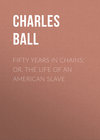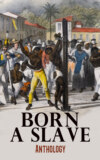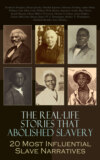Read the book: «Fifty Years in Chains; or, the Life of an American Slave»
PREFACE
The story which follows is true in every particular. Responsible citizens of a neighboring State can vouch for the reality of the narrative. The language of the slave has not at all times been strictly adhered to, as a half century of bondage unfitted him for literary work. The subject of the story is still a slave by the laws of this country, and it would not be wise to reveal his name.
CHAPTER I
SEPARATED FROM MY MOTHER
My story is a true one, and I shall tell it in a simple style. It will be merely a recital of my life as a slave in the Southern States of the Union – a description of negro slavery in the "model Republic."
My grandfather was brought from Africa and sold as a slave in Calvert county, in Maryland. I never understood the name of the ship in which he was imported, nor the name of the planter who bought him on his arrival, but at the time I knew him he was a slave in a family called Maud, who resided near Leonardtown. My father was a slave in a family named Hauty, living near the same place. My mother was the slave of a tobacco planter, who died when I was about four years old. My mother had several children, and they were sold upon master's death to separate purchasers. She was sold, my father told me, to a Georgia trader. I, of all her children, was the only one left in Maryland. When sold I was naked, never having had on clothes in my life, but my new master gave me a child's frock, belonging to one of his own children. After he had purchased me, he dressed me in this garment, took me before him on his horse, and started home; but my poor mother, when she saw me leaving her for the last time, ran after me, took me down from the horse, clasped me in her arms, and wept loudly and bitterly over me. My master seemed to pity her, and endeavored to soothe her distress by telling her that he would be a good master to me, and that I should not want anything. She then, still holding me in her arms, walked along the road beside the horse as he moved slowly, and earnestly and imploringly besought my master to buy her and the rest of her children, and not permit them to be carried away by the negro buyers; but whilst thus entreating him to save her and her family, the slave-driver, who had first bought her, came running in pursuit of her with a raw-hide in his hand. When he overtook us, he told her he was her master now, and ordered her to give that little negro to its owner, and come back with him.
My mother then turned to him and cried, "Oh, master, do not take me from my child!" Without making any reply, he gave her two or three heavy blows on the shoulders with his raw-hide, snatched me from her arms, handed me to my master, and seizing her by one arm, dragged her back towards the place of sale. My master then quickened the pace of his horse; and as we advanced, the cries of my poor parent became more and more indistinct – at length they died away in the distance, and I never again heard the voice of my poor mother. Young as I was, the horrors of that day sank deeply into my heart, and even at this time, though half a century has elapsed, the terrors of the scene return with painful vividness upon my memory. Frightened at the sight of the cruelties inflicted upon my poor mother, I forgot my own sorrows at parting from her and clung to my new master, as an angel and a saviour, when compared with the hardened fiend into whose power she had fallen. She had been a kind and good mother to me; had warmed me in her bosom in the cold nights of winter; and had often divided the scanty pittance of food allowed her by her mistress, between my brothers, and sisters, and me, and gone supperless to bed herself. Whatever victuals she could obtain beyond the coarse food, salt fish and corn bread, allowed to slaves on the Patuxent and Potomac rivers, she carefully distributed among her children, and treated us with all the tenderness which her own miserable condition would permit. I have no doubt that she was chained and driven to Carolina, and toiled out the residue of a forlorn and famished existence in the rice swamps, or indigo fields of the South.
My father never recovered from the effects of the shock, which this sudden and overwhelming ruin of his family gave him. He had formerly been of a gay, social temper, and when he came to see us on a Saturday night, he always brought us some little present, such as the means of a poor slave would allow – apples, melons, sweet potatoes, or, if he could procure nothing else, a little parched corn, which tasted better in our cabin, because he had brought it.
He spent the greater part of the time, which his master permitted him to pass with us, in relating such stories as he had learned from his companions, or in singing the rude songs common amongst the slaves of Maryland and Virginia. After this time I never heard him laugh heartily, or sing a song. He became gloomy and morose in his temper, to all but me; and spent nearly all his leisure time with my grandfather, who claimed kindred with some royal family in Africa, and had been a great warrior in his native country. The master of my father was a hard, penurious man, and so exceedingly avaricious, that he scarcely allowed himself the common conveniences of life. A stranger to sensibility, he was incapable of tracing the change in the temper and deportment of my father, to its true cause; but attributed it to a sullen discontent with his condition as a slave, and a desire to abandon his service, and seek his liberty by escaping to some of the free States. To prevent the perpetration of this suspected crime of running away from slavery, the old man resolved to sell my father to a southern slave-dealer, and accordingly applied to one of those men, who was at that time in Calvert, to become the purchaser. The price was agreed on, but, as my father was a very strong, active, and resolute man, it was deemed unsafe for the Georgian to attempt to seize him, even with the aid of others, in the day-time, when he was at work, as it was known he carried upon his person a large knife. It was therefore determined to secure him by stratagem, and for this purpose, a farmer in the neighborhood, who was made privy to the plan, alleged that he had lost a pig, which must have been stolen by some one, and that he suspected my father to be the thief. A constable was employed to arrest him, but as he was afraid to undertake the business alone, he called on his way, at the house of the master of my grandfather, to procure assistance from the overseer of the plantation. When he arrived at the house, the overseer was at the barn, and thither he repaired to make his application. At the end of the barn was the coach-house, and as the day was cool, to avoid the wind which was high, the two walked to the side of the coach-house to talk over the matter, and settle their plan of operations. It so happened that my grandfather, whose business it was to keep the coach in good condition, was at work at this time, rubbing the plated handles of the doors, and brightening the other metallic parts of the vehicle. Hearing the voice of the overseer without, he suspended his work, and listening attentively, became a party to their councils. They agreed that they would delay the execution of their project until the next day, as it was then late. They supposed they would have no difficulty in apprehending their intended victim, as, knowing himself innocent of the theft, he would readily consent to go with the constable to a justice of the peace, to have the charge examined. That night, however, about midnight, my grandfather silently repaired to the cabin of my father, a distance of about three miles, aroused him from his sleep, made him acquainted with the extent of his danger, gave him a bottle of cider and a small bag of parched corn, and then enjoined him to fly from the destination which awaited him. In the morning the Georgian could not find his newly purchased slave, who was never seen or heard of in Maryland from that day.
After the flight of my father, my grandfather was the only person left in Maryland with whom I could claim kindred. He was an old man, nearly eighty years old, he said, and he manifested all the fondness for me that I could expect from one so old. He was feeble, and his master required but little work from him. He always expressed contempt for his fellow-slaves, for when young, he was an African of rank in his native land. He had a small cabin of his own, with half an acre of ground attached to it, which he cultivated on his own account, and from which he drew a large share of his sustenance. He had singular religious notions – never going to meeting or caring for the preachers he could, if he would, occasionally hear. He retained his native traditions respecting the Deity and hereafter. It is not strange that he believed the religion of his oppressors to be the invention of designing men, for the text oftenest quoted in his hearing was, "Servants, be obedient to your masters."
The name of the man who purchased me at the vendue, and became my master, was John Cox; but he was generally called Jack Cox. He was a man of kindly feelings towards his family, and treated his slaves, of whom he had several besides me, with humanity. He permitted my grandfather to visit me as often as he pleased, and allowed him sometimes to carry me to his own cabin, which stood in a lonely place, at the head of a deep hollow, almost surrounded by a thicket of cedar trees, which had grown up in a worn out and abandoned tobacco field. My master gave me better clothes than the little slaves of my age generally received in Calvert, and often told me that he intended to make me his waiter, and that if I behaved well I should become his overseer in time. These stations of waiter and overseer appeared to me to be the highest points of honor and greatness in the whole world, and had not circumstances frustrated my master's plans, as well as my own views, I should probably have been living at this time in a cabin on the corner of some tobacco plantation.
Fortune had decreed otherwise. When I was about twelve years old, my master, Jack Cox, died of a disease which had long confined him to the house. I was sorry for the death of my master, who had always been kind to me; and I soon discovered that I had good cause to regret his departure from this world. He had several children at the time of his death, who were all young; the oldest being about my own age. The father of my late master, who was still living, became administrator of his estate, and took possession of his property, and amongst the rest, of myself. This old gentleman treated me with the greatest severity, and compelled me to work very hard on his plantation for several years, until I suppose I must have been near or quite twenty years of age. As I was always very obedient, and ready to execute all his orders, I did not receive much whipping, but suffered greatly for want of sufficient and proper food. My master allowed his slaves a peck of corn, each, per week, throughout the year; and this we had to grind into meal in a hand-mill for ourselves. We had a tolerable supply of meat for a short time, about the month of December, when he killed his hogs. After that season we had meat once a week, unless bacon became scarce, which very often happened, in which case we had no meat at all. However, as we fortunately lived near both the Patuxent river and the Chesapeake Bay, we had abundance of fish in the spring, and as long as the fishing season continued. After that period, each slave received, in addition to his allowance of corn, one salt herring every day.
My master gave me one pair of shoes, one pair of stockings, one hat, one jacket of coarse cloth, two coarse shirts, and two pair of trowsers, yearly. He allowed me no other clothes. In the winter time I often suffered very much from the cold; as I had to drive the team of oxen which hauled the tobacco to market, and frequently did not get home until late at night, the distance being considerable, and my cattle traveled very slow.
One Saturday evening, when I came home from the corn field, my master told me that he had hired me out for a year at the city of Washington, and that I would have to live at the Navy Yard.
On the New Year's day following, which happened about two weeks afterwards, my master set forward for Washington, on horseback, and ordered me to accompany him on foot. It was night when we arrived at the Navy Yard, and everything appeared very strange to me.
I was told by a gentleman who had epaulets on his shoulders, that I must go on board a large ship, which lay in the river. He at the same time told a boy to show me the way. This ship proved to be a frigate, and I was told that I had been brought there to cook for the people belonging to her. In the course of a few days the duties of my station became quite familiar to me; and in the enjoyment of a profusion of excellent provisions, I felt very happy. I strove by all means to please the officers and gentlemen who came on board, and in this I soon found my account. One gave me a half-worn coat, another an old shirt, and a third, a cast off waistcoat and pantaloons. Some presented me with small sums of money, and in this way I soon found myself well clothed, and with more than a dollar in my pocket. My duties, though constant, were not burthensome, and I was permitted to spend Sunday afternoon in my own way. I generally went up into the city to see the new and splendid buildings; often walked as far as Georgetown, and made many new acquaintances among the slaves, and frequently saw large numbers of people of my color chained together in long trains, and driven off towards the South. At that time the slave-trade was not regarded with so much indignation and disgust, as it is now. It was a rare thing to hear of a person of color running away, and escaping altogether from his master: my father being the only one within my knowledge, who had, before this time, obtained his liberty in this manner, in Calvert county; and, as before stated, I never heard what became of him after his flight.
I remained on board the frigate, and about the Navy Yard, two years, and was quite satisfied with my lot, until about three months before the expiration of this period, when it so happened that a schooner, loaded with iron and other materials for the use of the yard, arrived from Philadelphia. She came and lay close by the frigate, to discharge her cargo, and amongst her crew I observed a black man, with whom, in the course of a day or two, I became acquainted. He told me he was free, and lived in Philadelphia, where he kept a house of entertainment for sailors, which, he said, was attended to in his absence by his wife.
His description of Philadelphia, and of the liberty enjoyed there by the black people, so charmed my imagination that I determined to devise some plan of escaping from the frigate, and making my way to the North. I communicated my designs to my new friend, who promised to give me his aid. We agreed that the night before the schooner should sail, I was to be concealed in the hold, amongst a parcel of loose tobacco, which, he said, the captain had undertaken to carry to Philadelphia. The sailing of the schooner was delayed longer than we expected; and, finally, her captain purchased a cargo of flour in Georgetown, and sailed for the West Indies. Whilst I was anxiously awaiting some other opportunity of making my way to Philadelphia, (the idea of crossing the country to the western part of Pennsylvania, never entered my mind,) New Year's day came, and with it came my old master from Calvert, accompanied by a gentleman named Gibson, to whom, he said, he had sold me, and to whom he delivered me over in the Navy Yard. We all three set out that same evening for Calvert, and reached the residence of my new master the next day. Here, I was informed, that I had become the subject of a law-suit. My new master claimed me under his purchase from old Mr. Cox; and another gentleman of the neighborhood, named Levin Ballard, had bought me of the children of my former master, Jack Cox. This suit continued in the courts of Calvert county more than two years; but was finally decided in favor of him who had bought me of the children.
I went home with my master, Mr. Gibson, who was a farmer, and with whom I lived three years. Soon after I came to live with Mr. Gibson, I married a girl of color named Judah, the slave of a gentleman by the name of Symmes, who resided in the same neighborhood. I was at the house of Mr. Symmes every week; and became as well acquainted with him and his family, as I was with my master.
Mr. Symmes also married a wife about the time I did. The lady whom he married lived near Philadelphia, and when she first came to Maryland, she refused to be served by a black chambermaid, but employed a white girl, the daughter of a poor man, who lived near. The lady was reported to be very wealthy, and brought a large trunk full of plate and other valuable articles. This trunk was so heavy that I could scarcely carry it, and it impressed my mind with the idea of great riches in the owner, at that time. After some time Mrs. Symmes dismissed her white chambermaid and placed my wife in that situation, which I regarded as a fortunate circumstance, as it insured her good food, and at least one good suit of clothes.
The Symmes' family was one of the most ancient in Maryland, and had been a long time resident in Calvert county. The grounds had been laid out, and all the improvements projected about the family abode, in a style of much magnificence, according to the custom of the old aristocracy of Maryland and Virginia.
Appendant to the domicile, and at no great distance from the house, was a family vault, built of brick, in which reposed the occupants of the estate, who had lived there for many previous generations. This vault had not been opened or entered for fifteen years previous to the time of which I speak; but it so happened, that at this period, a young man, a distant relation of the family, died, having requested on his death-bed, that he might be buried in this family resting place. When I came on Saturday evening to see my wife and child, Mr. Symmes desired me, as I was older than any of his black men, to take an iron pick and go and open the vault, which I accordingly did, by cutting away the mortar, and removing a few bricks from one side of the building; but I could not remove more than three or four bricks before I was obliged, by the horrid effluvia which issued at the aperture, to retire. It was the most deadly and sickening scent that I have ever smelled, and I could not return to complete the work until after the sun had risen the next day, when I pulled down so much of one of the side walls, as to permit persons to walk in upright. I then went in alone, and examined this house of the dead, and surely no picture could more strongly and vividly depict the emptiness of all earthly vanity, and the nothingness of human pride. Dispersed over the floor lay the fragments of more than twenty human skeletons, each in the place where it had been deposited by the idle tenderness of surviving friends. In some cases nothing remained but the hair and the larger bones, whilst in several the form of the coffin was yet visible, with all the bones resting in their proper places. One coffin, the sides of which were yet standing, the lid only having decayed and partly fallen in, so as to disclose the contents of this narrow cell, presented a peculiarly moving spectacle. Upon the centre of the lid was a large silver plate, and the head and foot were adorned with silver stars. – The nails which had united the parts of the coffin had also silver heads. Within lay the skeletons of a mother and her infant child, in slumbers only to be broken by the peal of the last trumpet. The bones of the infant lay upon the breast of the mother, where the hands of affection had shrouded them. The ribs of the parent had fallen down, and rested on the back bone. Many gold rings were about the bones of the fingers. Brilliant ear-rings lay beneath where the ears had been; and a glittering gold chain encircled the ghastly and haggard vertebræ of a once beautiful neck The shroud and flesh had disappeared, but the hair of the mother appeared strong and fresh. Even the silken locks of the infant were still preserved. Behold the end of youth and beauty, and of all that is lovely in life! The coffin was so much decayed that it could not be removed. A thick and dismal vapor hung embodied from the roof and walls of this charnel house, in appearance somewhat like a mass of dark cobwebs; but which was impalpable to the touch, and when stirred by the hand vanished away. On the second day we deposited with his kindred, the corpse of the young man, and at night I again carefully closed up the breach which I had made in the walls of this dwelling-place of the dead.




















